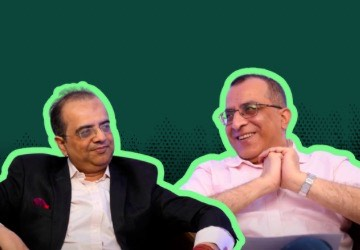
Why 3 Out of 4 Indians Still Hesitate to Seek Mental Health Care
“A Conversation with Dr. Samir Parikh, Chairperson Fortis National Mental Health Program”
In a candid conversation, Vivek Law, our host and renowned financial journalist, speaks with Dr. Samir Parikh, one of India’s leading psychiatrists and the chairperson of the Fortis National Mental Health Program. They delve into the pressing issues surrounding mental health, its growing recognition in society, and the challenges that continue to exist despite increased awareness.
The discussion revolves around the state of mental health in India, particularly in a post- pandemic world where awareness has surged but the stigma still lingers. Dr. Parikh highlights how the COVID-19 pandemic intensified the conversation around mental health, revealing a long-standing crisis that often remains in the shadows. As he mentions, “Mental health has always been an invisible issue, a significant elephant in the room.” Despite this, three out of four people globally still hesitate to seek help, a statistic that Dr. Parikh believes might be even higher in India due to limited access to mental health resources.
Dr. Parikh stresses the importance of viewing mental health on par with physical health, advocating for comprehensive mental health programs in schools and workplaces. He candidly states, “Corporate India has much to learn from schools… Organisations must foster a positive atmosphere to help individuals thrive.” He points out the shortcomings of Corporate India’s mental health efforts and offers suggestions on how they can improve. The interview also touches upon the generational shift in mindset toward instant gratification, financial pressures on the youth, and the rise of high-risk behaviours linked to mental well-being. Dr. Parikh warns, “The need to get rich quickly can lead individuals to make poor financial choices, which can exacerbate mental health issues.”
Sharing his personal strategies for maintaining a balanced life, Dr. Parikh emphasises the importance of disconnecting from technology: “One of the key things I’ve maintained since the start of my career is setting boundaries for myself. I turn off my gadgets after a certain hour.” He believes that mindful interactions, both online and offline, are crucial for mental well-being. The value of shared meals to foster connection also stands out, as he reflects, “For me, meals are events, and I cherish the time spent with family around the dining table.”
The conversation ends on a hopeful note, with Dr. Parikh reflecting on his three-decade-long career and his aspirations for a mentally healthier future, affirming that “We need to remember the value of humanity and kindness… The human component often feels lacking.”
Conversation Takeaways
- The Pandemic’s Impact: The COVID-19 crisis exposed an underlying mental health epidemic, yet stigma and reluctance to seek help persist. Conversations and access to mental health services need to continue growing.
- Corporate Responsibility: Corporate India lags behind in mental health initiatives compared to schools. Employers need to integrate mental health support into annual health checkups and provide continuous access to professionals.
- The Generational Shift: Younger generations face unique pressures, from financial challenges to the lure of quick wealth. Education must expand to include media literacy to help them navigate these influences.
- Digital Detox and Mindful Living: Dr. Parikh emphasises the importance of disconnecting from technology to maintain a healthy balance. He believes that mindful interactions, both online and offline, are crucial for mental well-being.
- Kindness in Competition: Healthy competition doesn’t need to be ruthless. Dr. Parikh advocates for empathy and compassion, even in competitive environments, reminding us that humanity should not be lost in the race for success.
Leave a Reply